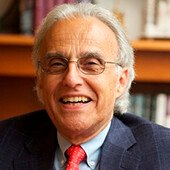John Esposito: The Academic Pioneer Shaping Islam-West Relations

Prof. John Esposito is a pioneering scholar, author, and advocate for interfaith dialogue who has profoundly shaped Western understanding of Islam. A leading voice in Islamic studies, Esposito’s work challenges misconceptions, fosters mutual respect, and bridges cultural divides. As the founder of the Center for Muslim-Christian Understanding, his career exemplifies dedication to academic integrity, global awareness, and the pursuit of knowledge in fostering meaningful conversations about Islam and its role in the modern world.
Early Life & Education
John Esposito was born in 1940 in Brooklyn, New York, and grew up in a traditional Italian-American Catholic household. His early education focused on philosophy and theology, with little connection to Islamic studies. Initially, he pursued a master’s degree in theology, intending to deepen his understanding of Catholicism. However, his academic journey took an unexpected turn when he was introduced to world religions, sparking a growing curiosity about Islam and Muslim societies.
During his doctoral studies at Temple University, Esposito delved into Islamic thought and history, challenging common misconceptions. His research led him to explore the complexities of political Islam, interfaith relations, and contemporary Muslim identities. This shift in focus laid the foundation for his influential career, shaping his role as a leading scholar in Islamic studies.
Career & Achievements
John Esposito began his career as a professor, initially teaching theology before shifting his focus to Islamic studies. His passion for interfaith dialogue and academic exploration led him to establish the Center for Muslim-Christian Understanding at Georgetown University. Through this platform, he has worked to foster meaningful discussions on Islam, bridging the gap between Muslim and Western societies. His scholarship has challenged stereotypes, advocating for a more nuanced understanding of Islam in global affairs.
Esposito has authored and edited over 50 books, making significant contributions to the field of Islamic studies. Key achievements in his career include:
- Groundbreaking Publications: His works, including The Oxford Encyclopedia of the Islamic World, have shaped modern discourse on Islam.
- Influence on Policy and Media: He has advised governments, participated in global discussions, and provided expert analysis on Muslim societies.
- Academic Leadership: His research and teachings have influenced generations of students, scholars, and policymakers worldwide.

Lessons & Resilience
John Esposito’s career offers valuable lessons in scholarship, resilience, and the power of dialogue. Key themes from his journey include:
- Commitment to Intellectual Integrity: Despite facing criticism from both Western and Muslim communities, Esposito remained dedicated to presenting objective, research-driven insights on Islam.
- Bridging Cultural Divides: His work highlights the importance of fostering understanding between different faiths and societies through education and dialogue.
- Perseverance in Challenging Stereotypes: By addressing misconceptions about Islam, he has contributed to more informed discussions in academia, policy, and global media.
Legacy & Impact
John Esposito’s work has significantly shaped global discourse on Islam, interfaith relations, and political movements. His research has influenced academic studies, media narratives, and policymaking, offering a balanced perspective on Muslim societies. Through his books and lectures, he has challenged stereotypes and promoted a deeper understanding of Islam in the West.
His contributions extend beyond academia, as his expertise has been sought by governments, journalists, and international organizations. By fostering dialogue and education, Esposito’s legacy continues to inspire scholars and advocates working toward global religious and cultural understanding.
Significant Moments :
- Founding the Center for Muslim-Christian Understanding (1993): Established at Georgetown University, this institution became a global hub for interfaith dialogue and Islamic studies.
- Publishing The Islamic Threat: Myth or Reality? (1992): This groundbreaking book challenged Western misconceptions about Islam and gained worldwide recognition.
- Advising Governments and Media Post-9/11: His expertise was widely sought to provide balanced perspectives on Islam, shaping public discourse and policy discussions.
Conclusion
Prof. John Esposito’s work has been instrumental in reshaping Western perceptions of Islam and fostering interfaith dialogue. His dedication to academic integrity, research, and education has left a lasting impact on global discourse. Through his scholarship, he has challenged misconceptions, influenced policy, and inspired future generations. His legacy continues to promote understanding, bridging cultural and religious divides in an increasingly interconnected world.
Facebook:John L. Esposito



